This month’s open thread for climate topics. Has anyone noticed how warm it’s been? Someone should probably look into that…
Climate Science
What is happening in the Atlantic Ocean to the AMOC?
For various reasons I’m motivated to provide an update on my current thinking regarding the slowdown and tipping point of the Atlantic Meridional Overturning Circulation (AMOC). I attended a two-day AMOC session at the IUGG Conference the week before last, there’s been interesting new papers, and in the light of that I have been changing my views somewhat. Here’s ten points, starting from the very basics, so you can easily jump to the aspects that interest you.
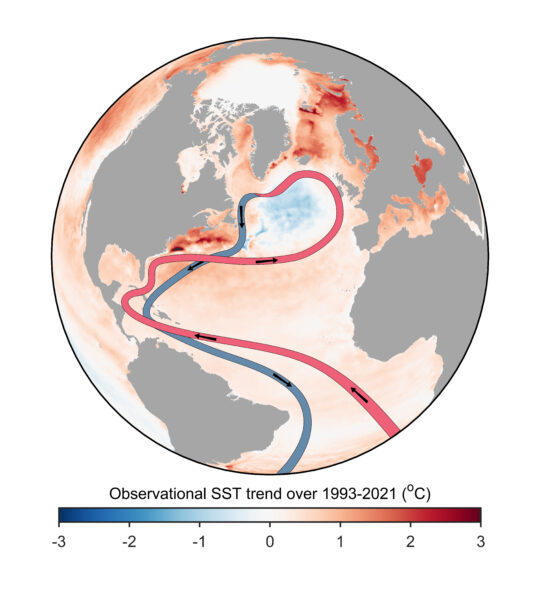
Area-based global hydro-climatological indicators
The World Meteorological Organisation (WMO) Global Climate Observing System (GCOS) and Copernicus Climate Change Services (C3S) both provide sets of global climate statistics to summarise the state of Earth’s climate. They are indeed valuable indicators for the global or regional mean temperature, greenhouse gas concentrations, both ice volume and area, ocean heat, acidification, and the global sea level.
Still, I find it surprising that the set does not include any statistics on the global hydrological cycle, relevant to rainfall patterns and droughts. Two obvious global hydro-climatological indicators are the total mass of water falling on Earth’s surface each day P and the fraction of Earth’s surface area on which it falls Ap.
[Read more…] about Area-based global hydro-climatological indicatorsBack to basics
You can tell how worried the climate deniers are by how many fields of science they have to trash to try and have people not see what’s happening.
it will not have escaped most people’s notice that global temperatures are heading into uncharted territory. The proximate cause of this week’s headlines is the Climate Reanalyzer website at the U. Maine which provides a nice front end to the NOAA NCEP CFS forecast system and reanalysis and shows absolute daily temperatures in early July clearly exceeding the highest pre-existing temperatures from August 2016. It’s an arresting graphic, and follows in from the record high ocean surface temperatures that were being reported a month ago.
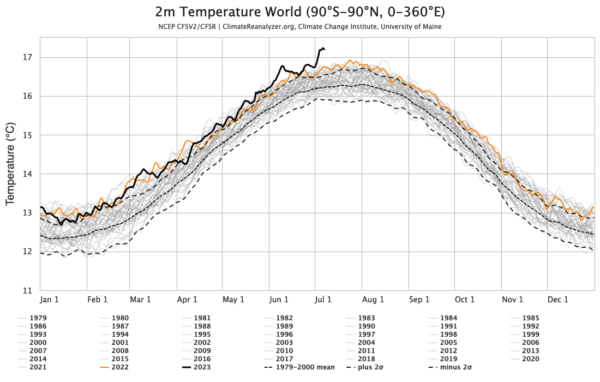
This is however a relatively new resource and was not online the last time that we set absolute temperature records (in summer 2016). So this has both salience and novelty – a potent combination!
The ultimate cause of these patterns is of course the ongoing global warming, driven almost entirely by human activities.
What are we looking at?
As we’ve explained before, all global temperature products are based on some kind of model – statistical, physical etc. There is no direct measurement of the global temperature – not from satellites, stations, or from the one random person who happens to be in most average place on Earth (where might that even be?). But that doesn’t mean the products aren’t useful!
In this particular instance we are looking at the output of a weather forecast model (NCEP CFS) that ingests multiple sources of in situ and satellite data every 3 hours which is then averaged over a day and over the surface of the planet. These calculations are precise reflections of what is in the model, but for multiple reasons this might not be a perfect reflection of what the real world is doing.
We looked at the coherence of different products, including the reanalyses, before and found that while they are highly correlated in terms of annual anomalies, they differ in their absolute magnitude (graphic from 2017).
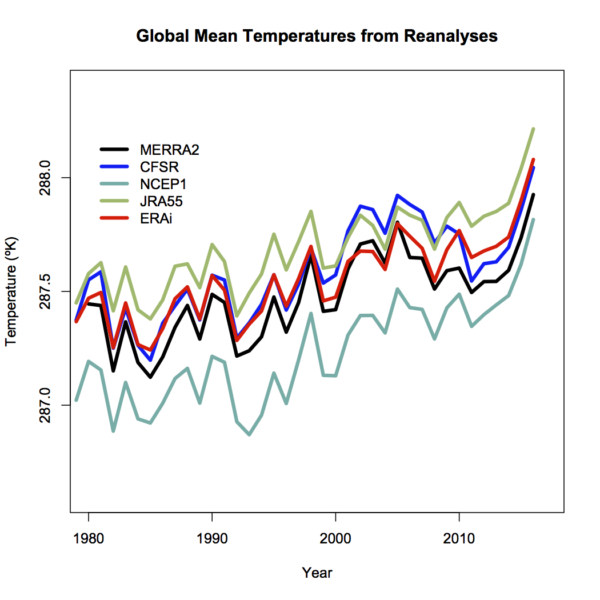
Differences will depend on resolution – higher resolution models have better (and higher topography) and then will have slightly cooler temperatures (all else being equal – which it isn’t!), tuning, model structure etc. and can’t really be discriminated using the pure (sparse) observations.
Coherence at the monthly scale is also quite good (though a little noisier), and I haven’t (yet) seen a good comparison of the coherence of the different products at the daily scale (note that the standard products (like GISTEMP, HadCRUT5 and NOAAv5) don’t produce a daily product). One might anticipate that there is a similarity, but perhaps not a one-to-one correspondence on exactly which days were the warmest.
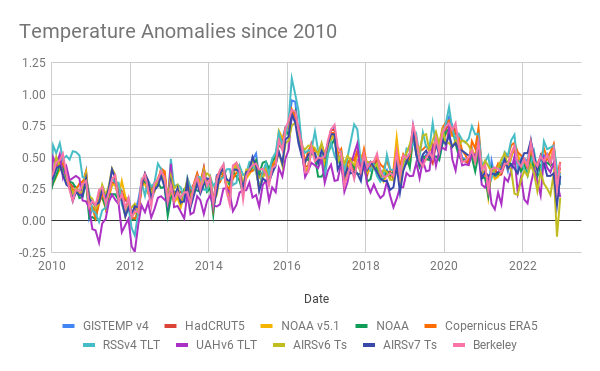
What are we seeing?
For the global temperature, it’s well established that the maximum is during the Northern Hemisphere summer. This sometimes comes as a surprise to people (why doesn’t the opposing seasonality in the Southern Hemisphere cancel this out?), but it relates to the fact that there is a lot more land in the Northern Hemisphere. Since the seasonal cycle over land is much larger than over the ocean (smaller heat capacity, and less evaporation), that means that the seasonal variations in the north outweigh the variations in the south.
Thus the months of July and August are generally the warmest in the year, and consequently we expect the warmest days during those months – and this is reflected in the CFS output (and in the ERA5 output also). The monthly variations are also reflected in the GISTEMP product which allows you to see the shifts from 1880 onward (about a 1ºC warming in each month since the late 19th C):
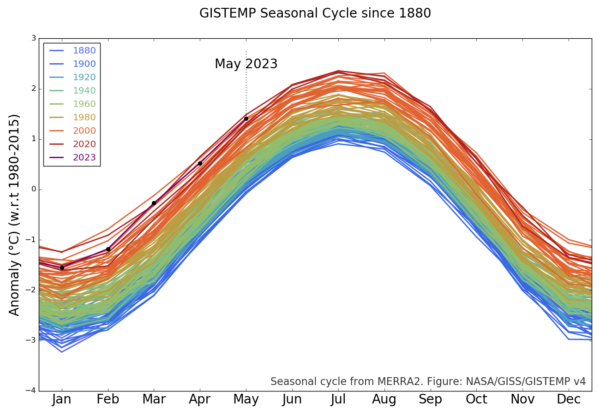
The station-based products are a little delayed with respect to the reanalyses, but they generally reflect the same patterns – thus one should expect the June temperatures in NOAA, GISTEMP and HadCRUT5 to be the warmest June on record. Given too, that these temperatures are being driven by persistent warming in the oceans, increasingly juiced by the growing El Niño event in the tropical Pacific, records in July and August are also likely. This is of course increasing the odds for 2023 to be a record year (I would estimate about 50% at this point).
But the WSJ Opinion page says that there’s no such thing as the global temperature!
Well, they would say that wouldn’t they. [Narrator: there is, in fact, a perfectly well defined global mean of any two-dimensional field defined on the sphere, including temperature].
More generously, one might think that their argument (such as it is), is that the global mean isn’t directly relevant for anyone. That is, no-one lives in the global mean, all impacts are local and driven by weather variations. But we’ve known for decades that the global mean change is a really good predictor (not perfect, but pretty good) of local impacts on heat waves, intense rainfall, drought intensity etc.
But let’s be honest, it’s basically pure distraction and attempts to complicate something that is pretty basic:
The climate is warming, records are being broken, and we are increasingly seeing the impacts.
I know why the WSJ doesn’t want you to realise this, but it’s not hard to see past their obfuscation.
Unforced variations: July 2023
Turning a new page[s]
The world is full of climate dashboards (and dashboards of dashboards), and so you might imagine that all datasets and comparisons are instantly available in whatever graphical form you like. Unfortunately, we often want graphics to emphasize a particular point or comparison, and generic graphs from the producers of the data often don’t have the same goal in mind. Dashboards that allow for more flexibility (like WoodForTrees) are useful, but aren’t as visually appealing as they could be. Thus, I find myself creating bespoke graphics of climate and climate model data all the time.
Some of these are maintained on the Climate model-observations comparison page but many of the graphs that I make (often to make a point on twitter) aren’t saved there and often their provenance is a bit obscure. Given that twitter will not last forever (though it might be around for slightly longer than a head of lettuce), it’s probably useful to have a spot to upload these graphics to, along with some explanation, to serve as a reference.
I have therefore created a couple of ‘pages’ (in wordpress speak) with fixed URLs where I will be curating relevant graphics I make (and findable at the bottom of the page under “DATA AND GRAPHICS”). The first is focused on the surface temperature records. I often update relevant graphics associated with this in early January (when we get another dot on the graphs), but there are associated graphs that I’ve made that don’t make it into those updates, so this is a place for them too. This includes the impacts of ENSO, comparisons across different platforms, or the impact of homogenization.
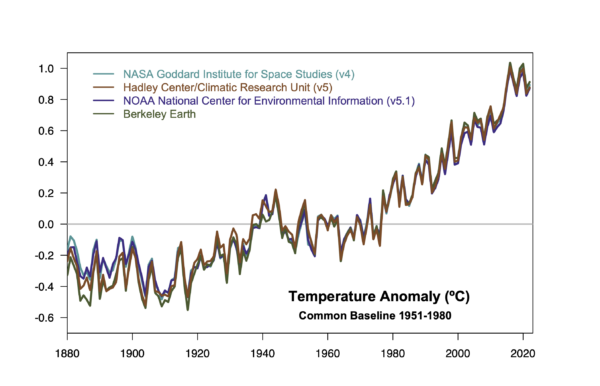
The second page is bit more eclectic. These are graphs that are relevant to some trope or talking point that often pops up, and my graphs are an attempt to provide context (usually), or to debunk it entirely. This is where you’ll find maps of where the climate is warming faster than the global average, time-series of river ice break-up dates, and an example of sensible scaling of CO2 changes and temperature.
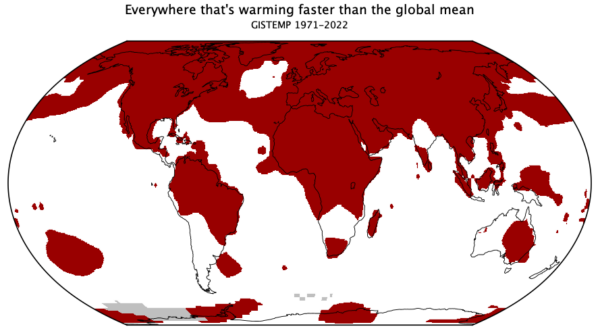
To start with, I’m just going to upload some graphs I’ve made recently (with any updates that are needed), and I’ll add content as I make something new. If there are any other ideas (that aren’t too involved!), I’ll be happy to look at adding those too. Let me know if this is useful.
Unforced Variations: Jun 2023
Evaluation of GCM simulations with a regional focus.
Do the global climate models (GCMs) we use for describing future climate change really capture the change and variations in the region that we want to study? There are widely used tools for evaluating global climate models, such as the ESMValTool, but they don’t provide the answers that I seek.
I use GCMs to provide information about large-scale conditions, processes and phenomena in the atmosphere that I can use as predictors in downscaling future climate projections. I also want to know whether the ensemble of GCM simulations that I use provides representative statistics of the actual regional climate I’m interested in.
[Read more…] about Evaluation of GCM simulations with a regional focus.CMIP6: Not-so-sudden stratospheric cooling
As predicted in 1967 by Manabe and Wetherald, the stratosphere has been cooling.
A new paper by Ben Santer and colleagues has appeared in PNAS where they extend their previous work on the detection and attribution of anthropogenic climate change to include the upper stratosphere, using observations from the Stratospheric Sounding Units (SSUs) (and their successors, the AMSU instruments) that have flown since 1979.
[Read more…] about CMIP6: Not-so-sudden stratospheric coolingReferences
- B.D. Santer, S. Po-Chedley, L. Zhao, C. Zou, Q. Fu, S. Solomon, D.W.J. Thompson, C. Mears, and K.E. Taylor, "Exceptional stratospheric contribution to human fingerprints on atmospheric temperature", Proceedings of the National Academy of Sciences, vol. 120, 2023. http://dx.doi.org/10.1073/pnas.2300758120